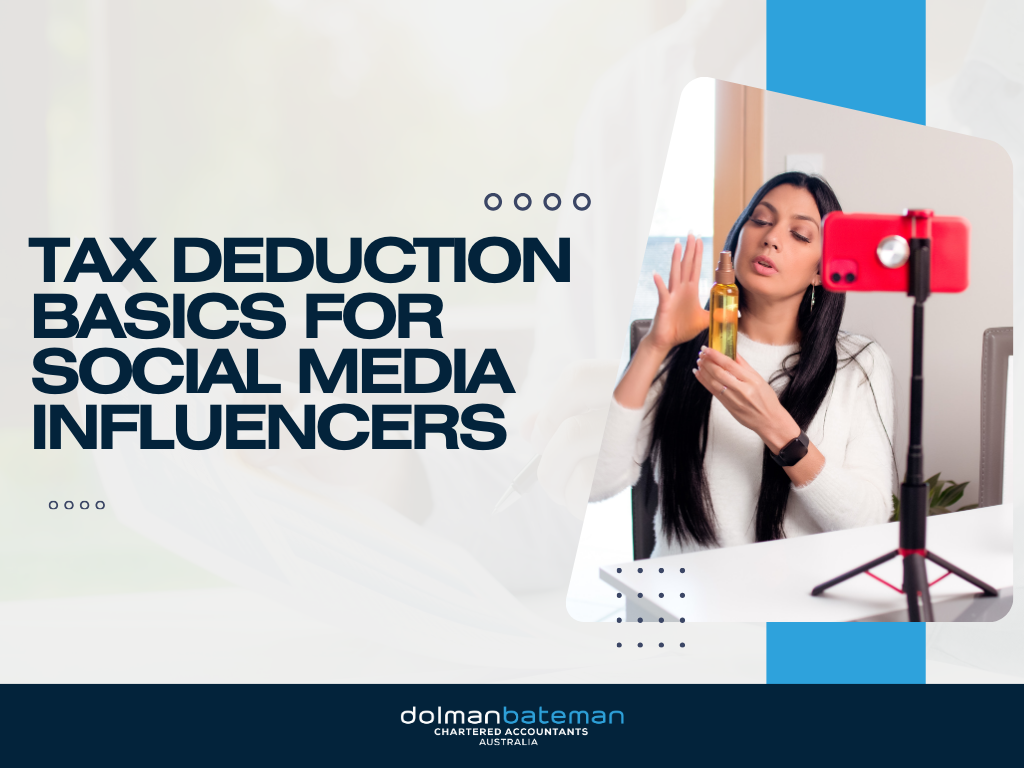Tax Deduction Basics for Social Media Influencers
- Arnold Shields

- Jul 17, 2024
- 3 min read
Updated: 3 days ago

Turning Your Online Presence into a Legit Business
If you’re thinking about turning your content creation into a real career, congratulations! The opportunities are endless. But with those opportunities come responsibilities, especially around tax.
This guide will help you understand your tax obligations as an influencer in Australia, including income tax, GST, deductions, and why accurate record-keeping is essential.
Are Influencers Considered a Business?
Yes. According to the Australian Taxation Office (ATO), social media influencers are generally considered sole traders or self-employed individuals. That means you're running a business and must treat your income, and expenses, accordingly.
Income Tax for Influencers
1. What Counts as Taxable Income?
All income you earn from your influencer activities is taxable. This includes:
Sponsorships and paid collaborations
Affiliate marketing commissions
Advertising revenue
Sale of physical or digital products
Free products, services, and experiences received in exchange for promotion (must be declared at market value)
2. How Much Tax Will You Pay?
Australia uses a progressive tax system. The more you earn, the higher your marginal tax rate. These brackets are updated annually, so always check the latest rates on the ATO website or speak with your accountant.
3. Claiming Tax Deductions
To reduce your taxable income, you can claim deductions on expenses that are directly related to generating income, such as:
Internet and mobile bills
Cameras, lighting, and editing software
Home office expenses
Business-related travel
Website hosting, domain names, and digital tools
GST and Influencers
If your gross income from Australian sources exceeds $75,000 per year, you must register for GST.
1. When and How to Register
Register once your turnover reaches the threshold, or if you expect to exceed it. Registration is handled through the ATO's Business Portal or via your tax agent.
2. Do You Charge GST?
Yes—on any goods or services provided to Australian clients. You’ll need to add 10% GST to your invoices and lodge BAS statements regularly.
Important: Income from overseas clients is considered GST-free.
3. Claiming GST Credits
When you buy Australian goods and services for your business (e.g. office supplies, cameras, subscriptions), you can claim the GST back as a credit.
Other Tax Considerations
1. PAYG Withholding
If you employ anyone, like a virtual assistant or editor, you may need to withhold tax from their wages and report this to the ATO.
2. Superannuation Obligations
You must also contribute to superannuation for any eligible employees you hire.
Record-Keeping: Your Best Defence and Tax Strategy
Maintaining good records is not optional, it’s a legal obligation. It also makes tax time far less painful and helps you avoid ATO scrutiny.
What to Track:
Income: invoices, bank statements, screenshots of transfers
Expenses: receipts, purchase orders, credit card statements
Digital tools: software like Xero, QuickBooks, or even Google Sheets can automate and organise your records
Why It Matters:
Helps you claim all deductions
Ensures ATO compliance (records must be kept for 5 years)
Prepares you in case of an ATO audit
Makes cash flow and tax planning easier
Stay Ahead with Professional Support
Understanding tax as an influencer isn’t always straightforward, but that’s where we come in. At Dolman Bateman, we help influencers like you stay compliant while maximising deductions and financial returns.
📞 Call us today on (02) 9411 5422 or visit www.dolmanbateman.com.au to book a confidential consultation.
Disclaimer: The information provided in this article is general in nature and does not constitute personal financial, legal or tax advice. While every effort has been made to ensure the accuracy of this content at the time of publication, tax laws and regulations may change, and individual circumstances vary. Dolman Bateman accepts no responsibility or liability for any loss or damage incurred as a result of acting on or relying upon any of the information contained herein. You should seek professional advice tailored to your specific situation before making any financial or tax decisions.



